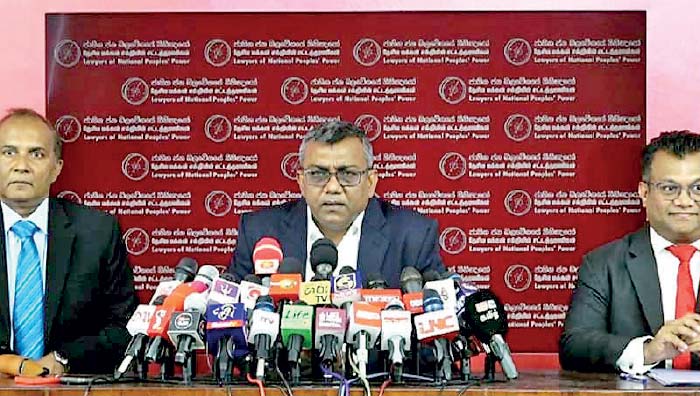Sunday Feb 15, 2026
Sunday Feb 15, 2026
Monday, 25 August 2025 05:01 - - {{hitsCtrl.values.hits}}
 Lawyers representing the ruling National People’s Power (NPP) said yesterday that Opposition parties were attempting to discredit the judicial process over the arrest of ex-President Ranil Wickremesinghe.
Lawyers representing the ruling National People’s Power (NPP) said yesterday that Opposition parties were attempting to discredit the judicial process over the arrest of ex-President Ranil Wickremesinghe.
Upul Kumarapperuma, PC told reporters that repeated public statements by the Opposition bordered on contempt of Court and risked eroding public trust in the judiciary. He said Wickremesinghe is facing charges under the Penal Code and the Public Property Act for allegedly misusing more than Rs. 18 million or £ 44,000 in State funds during a private trip to the UK, which included attending his wife’s graduation ceremony.
He added that under the Public Property Act, the misuse of more than Rs. 25,000 is treated as a criminal offence and suspects may be held in custody until trial unless bail is granted on exceptional grounds. The case involves over Rs. 18 million, making the charges serious and legally justified, he said.
Attorney-at-Law Akalanka Ukwatta noted this is the first time a former Sri Lankan president has been arrested on criminal charges. He said evidence from 32 witnesses and supporting documents had been presented to the Court, adding that the UK visit was not an official engagement. He said Opposition claims of political revenge overlook the fact that a structured investigation was completed before charges were filed.
Attorney-at-Law Hemaka Senanayake said if the Opposition disagreed with the Magistrate’s ruling, the proper course was to appeal to higher courts rather than mount public campaigns that undermine judicial independence. He accused political opponents of trying to stir unrest instead of arguing their case legally.
Attorney-at-Law Jayantha Dehi Aththage said the principle of equality before the law applied to all citizens, including Presidents and Ministers. He cited international precedents of leaders facing investigation and prosecution, and asked why Sri Lanka should be treated differently.
The lawyers concluded that the judiciary should be allowed to proceed without interference and warned that continued criticism outside the Court could amount to contempt and weaken confidence in democratic institutions.